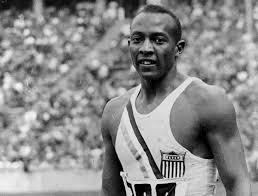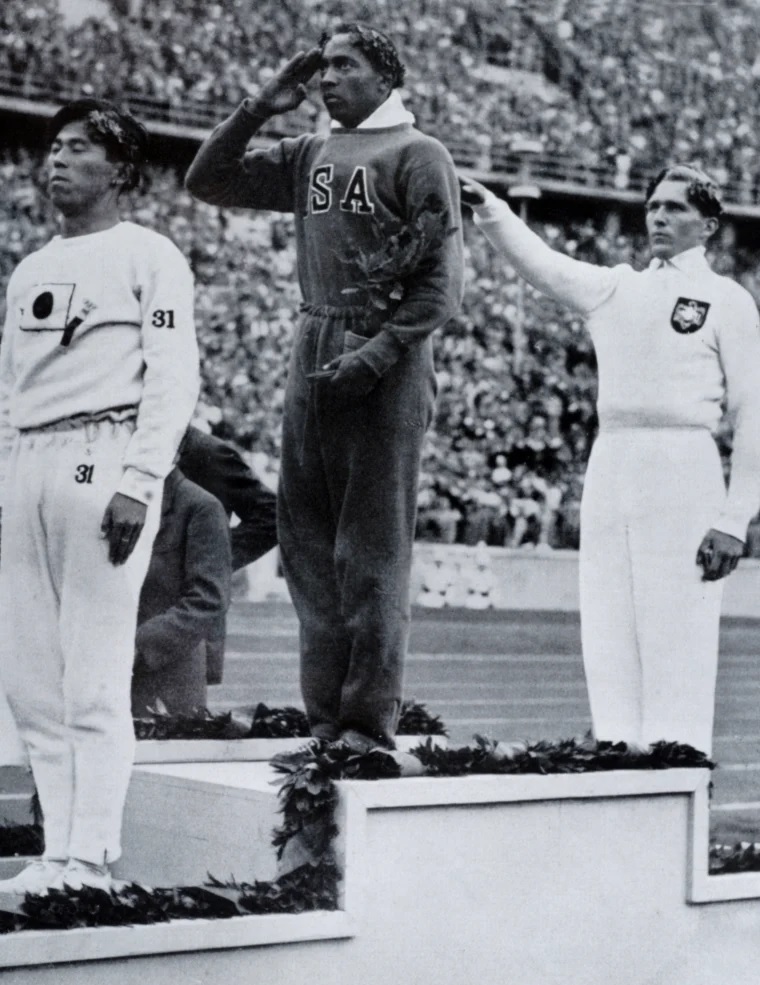Jesse Owens: A Triumph at the 1936 Berlin Olympics
Jesse Owens’ performance at the 1936 Summer Olympics in Berlin remains one of the most significant and memorable moments in sports history. Against the backdrop of Nazi propaganda and racial tension, Owens not only showcased extraordinary athletic prowess but also delivered a powerful blow to Adolf Hitler’s ideology of Aryan supremacy. This article delves into Owens’ remarkable achievements in Berlin, the context of the era, and the lasting impact of his victories.
Background and Context
The 1936 Summer Olympics, held in Berlin, Germany, were intended by Adolf Hitler and the Nazi regime to be a showcase of Aryan superiority. The games were heavily propagandized, with the Nazis aiming to demonstrate the dominance of the “master race.” However, the stage was set for an African American athlete from Alabama to challenge and ultimately dismantle these notions through sheer athletic excellence.
James Cleveland “Jesse” Owens was born on September 12, 1913, in Oakville, Alabama. Growing up in a segregated America, Owens faced significant racial discrimination but found solace and opportunity in athletics. His talent was evident from a young age, and he went on to set multiple world records in high school and at Ohio State University. By the time the Berlin Olympics arrived, Owens was already a formidable competitor on the international stage.
The Olympic Games
100 Meters Dash
The 100 meters dash was the first event in which Owens competed, and he quickly set the tone for his Olympic campaign. On August 3, 1936, Owens won the gold medal with a time of 10.3 seconds, tying the world record. His victory was a direct challenge to the Nazi propaganda, as he bested Germany’s own athletes in front of Hitler and a partisan crowd.
Long Jump
The long jump on August 4 provided one of the most dramatic moments of Owens’ Olympic experience. During the qualification rounds, Owens fouled on his first two attempts and faced the possibility of elimination. It was then that German competitor Luz Long offered Owens advice, suggesting he take off well before the board to ensure a legal jump. Following this advice, Owens qualified for the finals and went on to win the gold medal with a leap of 8.06 meters, setting an Olympic record. Owens’ victory was a testament to his skill and determination, and his friendship with Long became a symbol of sportsmanship transcending national and racial divides.
200 Meters Dash
Owens continued his dominance in the 200 meters dash on August 5. He won the gold medal with a time of 20.7 seconds, setting a new Olympic and world record. This victory marked his third gold medal and further cemented his status as the star of the Berlin Games.
4×100 Meters Relay
Owens’ final event was the 4×100 meters relay on August 9. The American team, consisting of Owens, Ralph Metcalfe, Foy Draper, and Frank Wykoff, was initially not favored to win. However, the team performed exceptionally well, setting a world record with a time of 39.8 seconds. Owens’ fourth gold medal was a remarkable achievement, making him the first American to win four gold medals in a single Olympic Games.
Impact and Legacy
Jesse Owens’ performance at the 1936 Berlin Olympics had profound and far-reaching implications. On the sports front, he set new standards of excellence and athleticism, with his records and achievements serving as benchmarks for future generations. However, the impact of Owens’ victories extended far beyond the realm of athletics.
Challenging Nazi Ideology
Owens’ triumphs directly contradicted the Nazi propaganda of Aryan superiority. His victories, especially in front of Hitler and a predominantly German audience, were a powerful repudiation of the racist ideology espoused by the Nazis. Owens’ success highlighted the fallacy of racial hierarchies and demonstrated the universality of human potential.
Symbol of Hope and Progress
For African Americans and other marginalized communities, Owens’ achievements represented hope and progress in the struggle for racial equality. At a time when segregation and discrimination were rampant in the United States, Owens’ success on the world stage was a powerful statement of the capabilities and resilience of African Americans. His victories became a source of pride and inspiration, fueling the ongoing fight for civil rights.
Legacy in Sports and Society
Owens’ legacy extends beyond his athletic achievements. He has been remembered as a trailblazer who paved the way for future generations of athletes, especially those of color. His story has been celebrated in books, films, and documentaries, ensuring that his contributions to sports and society are not forgotten.
In 1976, Owens was awarded the Presidential Medal of Freedom by President Gerald Ford, recognizing his contributions to the nation. In 1990, he was posthumously awarded the Congressional Gold Medal, further cementing his status as an American hero.
















